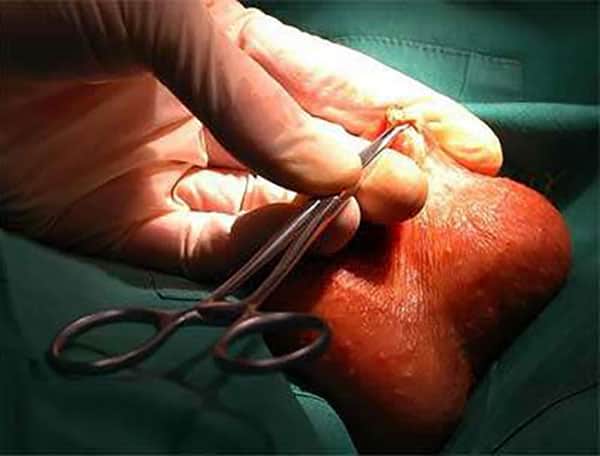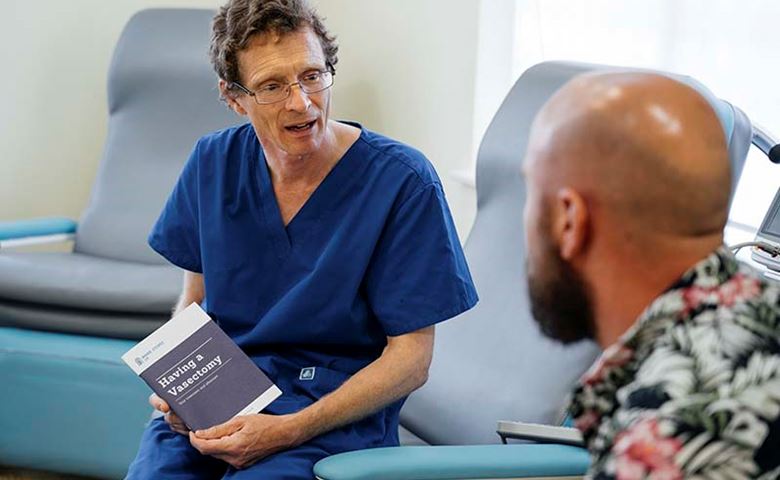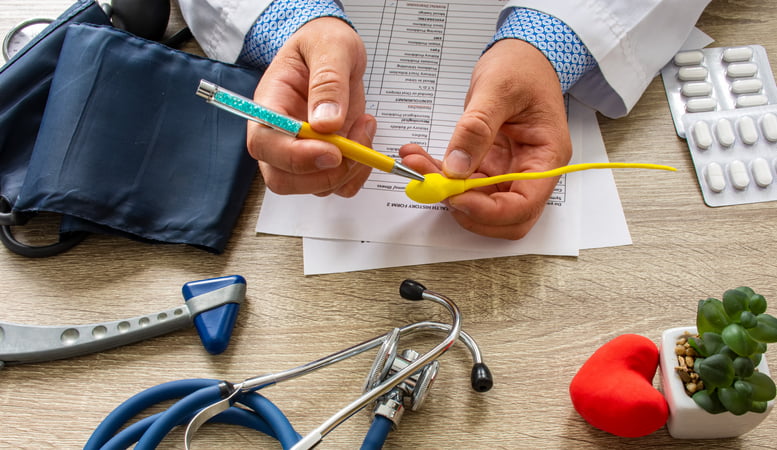When you decide to get a vasectomy, the first step is scheduling a consultation with a healthcare provider. But what exactly happens during this initial meeting?
The vasectomy consultation is a comprehensive appointment where you’ll receive essential information, undergo a medical evaluation, and have the opportunity to ask any questions you might have. This meeting sets the stage for a smooth procedure and a successful outcome.
Here’s a detailed look at what to expect during a vasectomy consultation:
What is a Vasectomy?
A vasectomy is a minor surgical procedure designed to provide permanent contraception for men. It involves cutting or sealing the vas deferens, the tubes that carry sperm from the testicles to the urethra.
Recommended: Can Ejaculating Too Soon After a Vasectomy Damage It?
This prevents sperm from mixing with semen during ejaculation, thus preventing pregnancy. The procedure is highly effective, with a success rate of over 99%.

How is a Vasectomy Performed?
During a vasectomy, a doctor makes small incisions in the scrotum to access the vas deferens. The tubes are then cut, tied, or sealed. The procedure typically takes about 30 minutes and can be performed under local anesthesia.
There are two main types of vasectomy: the conventional method, which involves small incisions, and the no-scalpel method, which uses a tiny puncture to reach the vas deferens. Both methods are equally effective.
What to Expect in the Initial Vasectomy Consultation
1. Medical History
Your vasectomy consultation will begin with a thorough review of your medical history. The doctor will ask about any past surgeries, chronic conditions, allergies, and medications you’re currently taking. This information helps assess your suitability for the procedure and identify any potential risks.
Recommended: How Long After Vasectomy Can I Drink Alcohol?
2. Physical Examination
A physical examination follows, focusing on the genital area. The doctor will check for any abnormalities that might complicate the surgery, such as varicoceles, hernias, or infections. This examination ensures that you are physically fit for the procedure.
3. Discussion of Reproductive Goals
One of the most important aspects of the consultation is discussing your reproductive goals. The doctor will ask why you are considering a vasectomy and whether you are certain about your decision.
Since a vasectomy is intended to be a permanent form of contraception, it’s essential that you are sure about not wanting more children in the future.
The doctor will also discuss alternatives to vasectomy, ensuring that you are fully informed before making a decision.
4. Explanation of the Procedure and Risks
The doctor will provide a detailed explanation of how the vasectomy procedure is performed. This includes a step-by-step overview, the type of anesthesia used, and what you can expect during and after the surgery. Understanding the procedure helps alleviate any anxiety you may have.
Recommended: Do Men Still Feel Pleasure After a Vasectomy?
Discussing potential risks and complications is also a critical part of the consultation. While vasectomies are generally safe, there are risks involved, such as infection, bleeding, and chronic pain. The doctor will explain these risks and how they are managed, giving you a clear picture of what to expect.

Preparing for the Vasectomy Procedure
1. Informed Consent
Before proceeding with the vasectomy, you will need to provide informed consent. This involves signing a document that confirms you understand the procedure, its risks, and the permanent nature of the surgery.
The consent form ensures that you are making an informed decision and acknowledges that you have had the opportunity to ask questions and discuss concerns.
2. Pre-Operative Instructions
The doctor will give you specific instructions to follow before the procedure. These may include guidelines on eating and drinking, medications to avoid, and what to wear on the day of the surgery.
Recommended: Will I Last Longer After a Vasectomy?
For example, you might be advised to stop taking blood-thinning medications a few days before the procedure to reduce the risk of bleeding.
Following these instructions carefully helps ensure a smooth surgery and recovery.

What to Expect in the Post-vasectomy Consultation
1. Scheduling the Procedure
Once you have decided to proceed with the vasectomy, the next step is to schedule the procedure. The doctor’s office will coordinate with you to find a suitable date and time.
In some cases, the vasectomy can be performed on the same day as the consultation, but often, it is scheduled for a later date to allow you time to prepare.
2. Aftercare and Recovery Plan
The doctor will discuss the aftercare plan to ensure a smooth recovery. This includes advice on managing pain, caring for the surgical site, and when you can resume normal activities.
You will also receive instructions on what to do if you experience any complications, such as signs of infection or excessive swelling.
Recommended: Are You Still a Virgin If You Use a Condom?
3. Follow-Up Appointments
Follow-up appointments are essential to monitor your recovery and ensure the vasectomy was successful. The doctor will schedule a semen analysis a few weeks after the procedure to confirm that no sperm are present in your ejaculate.
It’s important to use alternative contraception until you receive confirmation that the vasectomy was successful.
FAQs
Will a Vasectomy Affect My Sexual Function?
A common concern among men considering a vasectomy is whether it will impact their sexual function. The good news is that a vasectomy does not affect your ability to have erections or experience orgasm.
Since the procedure only prevents sperm from being released, it does not interfere with the production of testosterone or your overall sexual health.
Is the Procedure Painful?
While the idea of surgery can be daunting, a vasectomy is generally not painful. You will receive local anesthesia to numb the area, so you should not feel any pain during the procedure.
Some men experience mild discomfort or a pulling sensation, but this is usually well-tolerated. After the procedure, you may experience some soreness and swelling, which can be managed with over-the-counter pain medications and ice packs.
How Long is the Recovery Period?
The recovery period after a vasectomy is typically short. Most men can return to work and normal activities within a few days. However, it’s important to avoid strenuous activities and heavy lifting for at least a week to prevent complications.
Following the doctor’s aftercare instructions will help ensure a smooth and quick recovery.
What If I Change My Mind?
It’s crucial to understand that a vasectomy is intended to be a permanent form of contraception. While vasectomy reversal procedures exist, they are complicated, expensive, and not always successful.
Therefore, you should only proceed with a vasectomy if you are certain about your decision to avoid having more children in the future.
Final Thoughts
A vasectomy consultation is a vital step in the decision-making process for men considering this form of contraception. By providing comprehensive information, addressing concerns, and ensuring you are fully informed, the consultation helps you make an educated and confident decision.
If you have any lingering questions or uncertainties, don’t hesitate to reach out to your healthcare provider. Their goal is to support you in making the best choice for your reproductive health.
